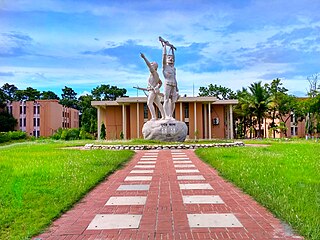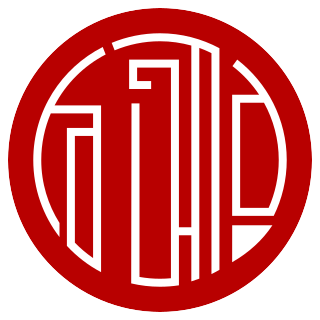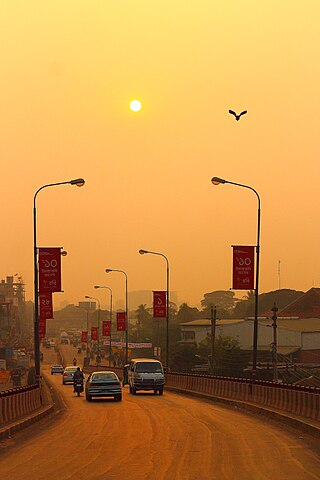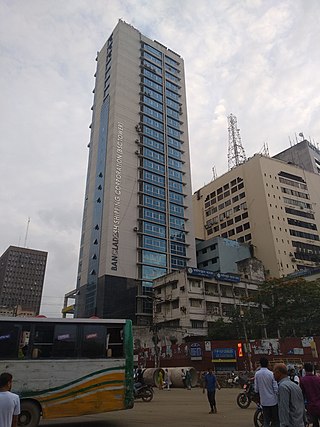
Dhaka, formerly known as Dacca, is the capital and largest city of Bangladesh. It is the ninth-largest and seventh-most densely populated city in the world. Dhaka is a megacity, and has a population of 10.2 million residents as of 2022, and a population of over 22.4 million residents in Dhaka Metropolitan Area. It is widely considered to be the most densely populated built-up urban area in the world. Dhaka is the most important cultural, economic, and scientific hub of Eastern South Asia, as well as a major Muslim-majority city. Dhaka ranks third in South Asia and 39th in the world in terms of GDP. Lying on the Ganges Delta, it is bounded by the Buriganga, Turag, Dhaleshwari and Shitalakshya rivers. Dhaka is also the largest Bengali-speaking city in the world.

Chittagong, officially Chattogram, is the second-largest city in Bangladesh. Home to the Port of Chittagong, it is the busiest port in Bangladesh and the Bay of Bengal. It is the administrative seat of an eponymous division and district. The city is located on the banks of the Karnaphuli River between the Chittagong Hill Tracts and the Bay of Bengal. The Greater Chittagong Area had a population of more than 5.2 million in 2022. In 2020, the city area had a population of more than 3.9 million. The city is home to many large local businesses and plays an important role in the Bangladeshi economy.

Khulna is the third-largest city in Bangladesh, after Dhaka and Chittagong. It is the administrative center of the Khulna District and the Khulna Division. Khulna's economy is the third-largest in Bangladesh, contributing $53 billion in gross regional domestic product and $95 billion in purchasing power parity (PPP) in 2020. In the 2024 census, the city corporation area had a population of 884,445.

Bangladesh Railway is the state-owned rail transport agency of Bangladesh. It operates and maintains all railways in the country, and is overseen by the Directorate General of Bangladesh Railway. The Bangladesh Railway is governed by the Ministry of Railways and the Bangladesh Railway Authority. Its reporting mark is "BR".

Tongi is a major township in Gazipur, Bangladesh, with a population of 350,000. It hosts the Biswa Ijtema and features a BSCIC industrial area, which produces BDT 1500 crore of industrial products annually, and marks the northern border of Dhaka since 1786. Tongi Shahid Smrity high School compound is mass burial site of the genocide in Liberation War of Bangladesh.

The Port of Dhaka is a major river port on the Buriganga River in Dhaka, the capital and largest city of Bangladesh. The port is located in the southern part of the city. It is Bangladesh's busiest port in terms of passenger traffic. The port has services to most of the districts of Bangladesh. In 2013, a container terminal opened 20 kilometres (12 mi) from the city to handle ocean-going ships. Along with Barisal, Chandpur and Narayanganj; the Dhaka port handled 53 million tonnes of cargo and 22 million passengers in 2013–14.

Bangladesh Shipping Corporation is a state-owned, autonomous corporation in Bangladesh. It owns a number of ships and oil tankers, and also charters sea-going vessels from other operators. The vessels are used to carry ready-made garments and other export items, and also to import crude oil from Saudi Arabia and UAE.
Aricha Ghat is an important river port in Bangladesh. It is situated in Manikganj District. The port is managed by Bangladesh Inland Water Transport Authority. Daulatdia-Paturia route ferries ply from this port.

Bangabandhu Sheikh Mujibur Rahman Maritime University (BSMRMU) was established in 2013, the 37th public university of the country. It is the first maritime university in Bangladesh, the 3rd maritime university in South Asia and the 12th maritime university in the world. It has issued its first calls for admission in December, 2016. The BSc in Oceanography program was started on 3 January 2017 at the University's temporary campus in Mirpur, as part of the first-ever launch of the Bachelor class in the University. Then in 2018, the first batch of BSc in Naval Architecture and Offshore Engineering classes started. Two more program classes started in 2019. LLB in Maritime Law and BBA in Port Management and Logistics. 2020 BSc in Maritime Fisheries first batch admission and classes start.

The Government agencies in Bangladesh are state controlled organizations that act independently to carry out the policies of the Government of Bangladesh. The Government Ministries are relatively small and merely policy-making organizations, allowed to control agencies by policy decisions. Some of the work of the government is carried out through state enterprises or limited companies.
The Port of Pangaon is an inland port and container terminal on the Buriganga River in Dhaka District, Bangladesh. It serves as a cargo port for Bangladesh's capital and largest city Dhaka. It was opened in 2013. It is the first river port of its kind in Bangladesh.

The 1970s was a decade of the Gregorian calendar that began on 1 January 1970, and ended on 31 December 1979. It was a very significant decade in the history of Bangladesh, because this is the decade in which Bangladesh emerged as a sovereign state. The decade began with a devastating cyclone that ravaged the southern part of the country. The next year the country went into Liberation war and achieved independence from Pakistan. The government of Sheikh Mujibur Rahman administered the newly formed country between 1972–1975, but their rule soon came to an end through a series of coups and counter coups in the later part of the decade. Economically the country struggled because of the war (1971) and famine (1974) throughout the decade and was highly dependent on foreign aids. Culturally, in this decade Bangladesh started to establish its own identity as an independent nation.

Major Rafiqul IslamBir Uttam is a Bangladesh Awami League politician and the incumbent Jatiya Sangsad member from Chandpur-5 constituency.

Faruque Alam was a Bangladeshi Civil Engineer, Wood Technologist and the Chairman of Bangladesh Inland Water Transport Corporation (BIWTC). He was elected Member of Parliament from Shariatpur-3 constituency during 1986 Bangladeshi general election under Jatiya Party banner.

The Port of Barisal, officially known as Barisal River Port is the second largest and busiest river port in Bangladesh after Dhaka in terms of passenger traffic. It is located on the banks of the Kirtankhola river in the city of Barisal. The port operates daily services between Dhaka and Barisal as well as most of the districts in southern part of the country including Chandpur, Narayanganj, Bhola, Laxmipur, Pirojpur and Barguna. It also operates inter-district routes around Barisal.
Sheikh Maqsood Ali was a Bangladeshi civil servant, researcher, writer and organiser of the Liberation War of Bangladesh. He served as Secretary of Ministry of Relief and Rehabilitation of Bangladesh.
Abul Khair Group is a Bangladeshi diversified conglomerate based in Chattogram. Abul Kashem is the chairperson and Abul Hashem is the managing director of Abul Khair Group. Abu Syed Chowdhury is the deputy managing director and Shah Shafiqul Islam is the group director. All four are sons of Abul Khair.
QABM Rahman Former Bangladeshi government official who was a freedom fighter. He was first the director and later the director general of Bangladesh Inland Water Transport Authority. He was the first Chairman and managing director of Bangladesh Shipping Corporation.













